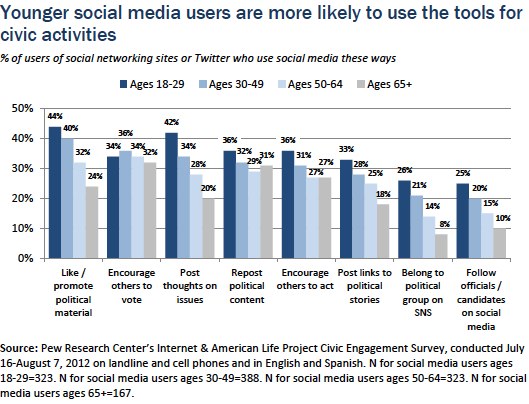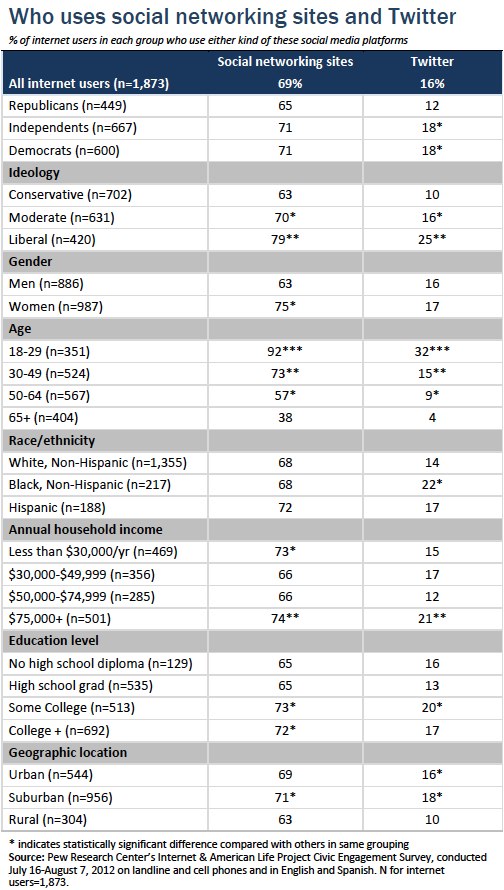Social Media and Political Engagement
Engagement through social networking sites and Twitter has become a marked feature of political and civic life for a significant portion of Americans. Previous work by the Pew Research Center’s Internet & American Life has documented the key role that the internet and social media play in people’s participation in groups and organizations.1 Other Project studies have shown how those who use social media, especially Facebook, are more civically and politically active than non-users,2 and how those who use social media to participate in civic and political life are more diverse in socio-economic terms than those who participate in civic affairs through more traditional online and offline activities such as signing petitions or interacting with news organizations.3
During the summer of this election year, the Project conducted a nationally representative survey of 2,253 adults ages 18 and older and asked a series of questions about civic engagement through people’s use of social networking sites and Twitter. In the sample, 85% of the respondents are internet users; 69% of the internet users say they use social networking sites, and 16% use Twitter. In all, 60% of all American adults use either a social networking site (like Facebook, LinkedIn, or Google+) or use Twitter.
Among those social media users, the survey found:
- 38% of those who use social networking sites (SNS) or Twitter use those social media to “like” or promote material related to politics or social issues that others have posted. The social media users under age 50 and those who have at least some college experience are more likely than others to use social media this way.
- 35% of social media users have used the tools to encourage people to vote. There is not notable variance among different age groups on this activity. Those who have some college experience are more likely than others to have used social media this way.
- 34% of social media users have used the tools to post their own thoughts or comments on political and social issues. The social media users who are ages 18-29 are notably more likely than older users to have posted their own comments, as are those who have at least some college experience.
- 33% of social media users have used the tools to repost content related to political or social issues that was originally posted by someone else. The social media users who are college graduates (39%) are more likely than others to have used social media this way.
- 31% of social media users have used the tools to encourage other people to take action on a political or social issue that is important to them. Younger adults (ages 18-29) who use social media are a bit more likely than older users to have done this. And those with some college experience are more likely than others to have done this.
- 28% of social media users have used the tools to post links to political stories or articles for others to read. Young adults who use social media are more likely than others to have done this, as are those with some college experience.
In addition to asking about the use of social media for those activities, we also asked about group engagement via social media and engagement with public officials and candidates. The results:
- 21% of those who use SNS or Twitter belong to a group on an SNS that is involved in political or social issues, or that is working to advance a cause. Whites who use social media (24%) are more likely than the social media users who are black (13%) or Hispanics (12%) to belong to such groups. And adults under age 50 are more likely than older social media users to belong to such groups.
- 20% of social media users have used the tools to follow elected officials and candidates for office. Whites (22%) and blacks (25%) who use social media are more likely than Hispanic social media users (8%) to follow public officials or candidates. The same holds true for social media users under age 50 and those with at least some college experience.

The politics of social networking site users and Twitter users
Some 60% of all American adults use either social networking sites or Twitter. Some 69% of online adults use SNS and 16% use Twitter and, of course, a notable number of internet users exploit both platforms.
The internet users who are liberals are more likely than their ideological counterparts to use social networking sites and Twitter for all kinds of reasons—not just for political purposes. The table below shows the partisan and ideological composition of the SNS user population and Twitter users and some of their other key demographic information.



